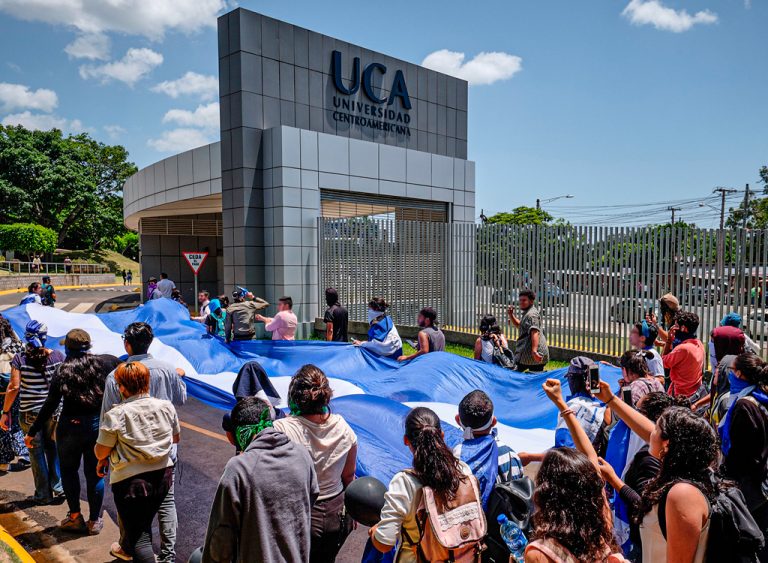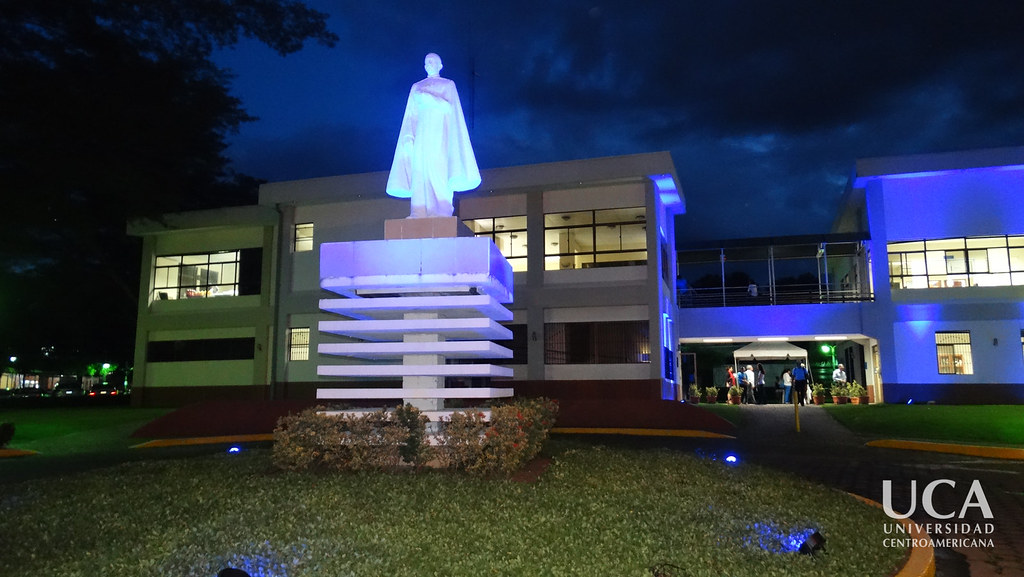23 de agosto 2023

Children of Exile: The Births “Sowing Hope” in the Camp of Nicaraguan Farmers

PUBLICIDAD 1M
PUBLICIDAD 4D
PUBLICIDAD 5D
Ortega has stolen the UCA because of "his hatred of critical thinking," and subjects Nicaragua to deceit, more migration and poverty

Foto: Confidencial
The theft of the Central American University (UCA), carried out by Daniel Ortega's dictatorship, threatens Nicaragua as a whole because Ortega's intention is to abolish freedom of thought and silence any attempt at criticism, according to academics and professors who analyze the impact of the confiscation and closure of the alma mater.
"The implications are dire, incalculable at the moment. And the most affected are the Nicaraguan people," says Armando, who has taught at the UCA for a decade.
"Armando"
Professor at the UCA for more than a decade
“The UCA was the only option that was diverse, culturally broad, and in which many of us felt we were in a space in the country where you could forget that you were in such a complicated political context.".
Since September 2018, following the massacre and repression against the April Rebellion, Nicaragua has been under a de facto police state. Founded in 1960 by the Jesuits, the UCA was the first private university in Central America, and one of the last spaces that promoted free and critical thinking, in an academic environment of excellence and international recognition.
With an enrollment of more than 5,000 undergraduate and graduate students, more than 500 tenured and tenure-track faculty and some 200 administrative collaborators, it was also a reference point for academic excellence and one of the best equipped universities in the country.
On the night of August 17, just after the confiscation of the UCA, the Ortega dictatorship ordered its emblems removed, and the following morning, the campus became a "new" state university, baptized as "Casimiro Sotelo National University".
A Nicaraguan specialist in higher education, who asked to be identified as Luis to avoid political persecution, says that the confiscation of the UCA disrupts the country, and he considers this a "very far-reaching" act.
The specialist warns that with the transformation of seized and confiscated universities into state universities, "what is left in Nicaragua cannot be called university education."
"Luis"
Nicaraguan education specialist
"They are not universities in the real sense. They are institutions that can give out a diploma, but what makes a school a university? Its cultural life, its critical thinking, the interchange, debate, the creation of knowledge. None of this is left. With the closing of the UCA, that's the end of it."
Armando fears that the closing of the UCA "will trigger a massive flight of young people." These young people, he suggests, "will not only look for better job opportunities [outside the country], but also for training, because in Nicaragua there are no institutions that are independent from the government".
In its social media platforms, CONFIDENCIAL invited the community to share their experiences, memories and reactions to the confiscation of the UCA. In the responses, what abounds are testimonies of indignation and stories of those facing the loss of their academic and professional future.
With the confiscation of the UCA, the number of Nicaraguan universities closed by the government between December 2021 and August 2023 has risen to 27. Most of the schools were charged by the Ortega government with deficient academic offerings or non-compliance with its obligations to the Governance Ministry. The UCA, which enjoys an unquestionable academic reputation, was accused of "terrorism".
Professor Armando considers that the UCA "was the last link in the chain for the government to put an end to independent education options."
After the seizures of the universities, the Ortega's government's next step is indoctrination. In the "new" state universities, the authorities imposed by the National Council of Universities (CNU) are happy to carry out political proselytism in favor of the dictatorship.
"They have become political spaces where the only thing they do is to repeat what the regime wants. They are repressive centers, without any kind of autonomy," says Luis. As an example, he cites the case of the National Autonomous University of Nicaragua (UNAN). This university expelled the students who led the civic protests of 2018 and its professors and students are under constant political surveillance.
On August 18, in his first speech as rector of the "new" state university in the facilities stolen from the UCA, Alejandro Genet Cruz, began, "We thank God, supreme being, the Sandinista Popular Revolution, our president commander Daniel Ortega Saavedra and our vice president comrade Rosario Murillo, the National Council of Universities, for the trust placed in this team to assume such a historic, revolutionary, social and educational mission in the leadership of this house of higher education." The event was full of flags of the Sandinista Front.
The education specialist Luis says it is evident that the goal is to "abolish education" because "they do not want citizens, they want clients who are satisfied with a sheet of zinc... with a bag of basic grains during La Purisima.”

Academics, former rectors, students and professors at the UCA agree that the closure is an act of revenge against the university and the Jesuits for their role during the social outburst of 2018, when they supported their students in the face of police brutality and denounced serious human rights violations.
On May 12, 2018, Jesuit authorities issued a call to "assume with determination the defense of students' lives and the inviolability of university campuses," and condemned state violence.
Days later, on May 30, the UCA opened its doors to protect thousands of Nicaraguans seeking refuge from police and paramilitary bullets that attacked the April Mothers' Day march.
In 2020, celebrating sixty years since its founding, the UCA described itself as a "pioneering, resilient and inspiring" university. Its then rector, Father José Alberto Idiáquez, reaffirmed the alma mater as "a university dedicated to integral education, defense of university autonomy in its purest sense, the education of citizens who seek justice and the common good, and to the transformation of society."
During the nineties, the UCA led student marches demanding 6% of the national budget, as stipulated in the Constitution. The priest, economist, and UCA rector Xabier Gorostiaga strove to improve the university's sources of income in order to "free education from poverty, so that education can free our people from poverty."
During the anniversary event, the former rector of UNAN-Managua and long-serving academic, Carlos Tünnermann Bernheim, highlighted that from its beginnings, the UCA established a scholarship fund, and that a large part of the 6% –which it stopped receiving in 2022– was assigned to help low-income students. "The UCA has never been an elitist university. The composition of its enrollment shows that young people from a broad range of social strata study there," he says.
In 2021, when the CNU had already begun to economically asphyxiate the UCA through budget reduction, reducing the number of scholarships the institution could grant, an estimated 5757 students –out of an enrollment of 5891– were receiving partial or full scholarships, according to a report from the same CNU that excluded the UCA from the government's university budget line item following Ortega's orders.
The UCA survived the 1972 earthquake, the political pressures of the Somoza dictatorship, the economic asphyxiation and political persecution of the Ortega dictatorship, police intimidation and death threats to its rector José Alberto Idiáquez, later banished from the country.
Throughout, Dr. Tünnermann emphasized at the anniversary event, the UCA "has always known how to act as befits an authentic University. That is to say, an institution that defends the honor of the Nicaraguan academy by remaining faithful to its principles of being a center for independent thought, where critical thinking is cultivated, where what is offered is a higher education imbued with values, fully aware of its ethical and moral commitment to Nicaragua."
Luis, the education specialist, affirms that "those most affected by the closing of the UCA are the poorest people in Nicaragua" who had access to an education "that no other institution can give them." Also affected are those Nicaraguans who benefited from the university's volunteer and community development programs through its institutes and research centers.
Luis added, "The UCA has definitely been, in the midst of all its limitations, the best university in Nicaragua." In 2012, in fact, it was included in the Quacquarelli Symonds ranking, which lists the 250 most prestigious higher education institutions in Latin America. The UCA was the only Nicaraguan university in that list. Its educational offerings were also supported by an international network of universities that allowed for valuable academic exchanges.
Luis says that the Ortega-Murillo family will leave Nicaragua at some point. He regrets, however, that "they will leave a country that we will have to clean up with a broom and dustpan, a devastated country, with things that can no longer be rebuilt. We'll have to start from scratch, and I don't know if we're going to be able to do that…. Everything in Nicaragua has been demolished."
This article was originally published in Spanish in Confidencial and translated by our staff.
PUBLICIDAD 3M
Confidencial es un diario digital nicaragüense, de formato multimedia, fundado por Carlos F. Chamorro en junio de 1996. Inició como un semanario impreso y hoy es un medio de referencia regional con información, análisis, entrevistas, perfiles, reportajes e investigaciones sobre Nicaragua, informando desde el exilio por la persecución política de la dictadura de Daniel Ortega y Rosario Murillo.
PUBLICIDAD 3D